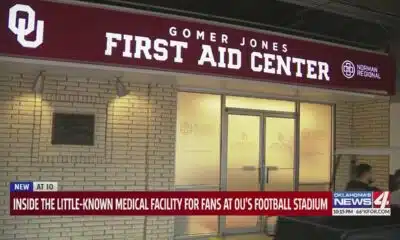News from the South - Missouri News Feed
After battery plant fire, southeast Missouri town alarmed about potential contamination
After battery plant fire, southeast Missouri town alarmed about potential contamination
by Allison Kite, Missouri Independent
February 17, 2025
FREDERICKTOWN — Jennifer Torr was at a coffee shop next door to the the Critical Mineral Recovery battery recycling plant when it caught fire in October, sending a tower of smoke into the air.
She had no idea when she and her husband, Darin, bought their blueberry farm a few miles north of town that the facility might one day pose a danger. But when she saw the building erupt in flames, she immediately thought, “we have to get out of this area.”
“I remember my husband and I getting in our vehicle and texting my kids, ‘You guys need to pack some bags,’” Torr said in an interview.
By the time they got back to the farm just over eight miles away, her family members were covering their faces to guard against the smell and fumes from the fire while they packed their car.
Since the fire, Torr and other residents have been organizing to bring their concerns to Madison County and state officials about the battery plant and a cobalt mine on the other side of town. Fredericktown lies at the heart of Missouri’s old Lead Belt. After generations of contamination from lead mining, residents worry now that battery development and recycling poses yet another health hazard.
“Will my grandchildren be sitting here and saying, ‘My grandma tried to stop this 60 years ago and now we’re all sick because nobody would listen?’” Kimi Royer asked her state legislator, Republican Rep. Dale Wright of Farmington, on a visit to Jefferson City earlier this month.
It took days for firefighters to fully extinguish the blaze at Critical Mineral Recovery, which recycled lithium-ion batteries. The facility opened at the edge of Fredericktown in 2023. Now, only its burnt husk remains.
Parts of Fredericktown were evacuated when the facility went up in flames, and families who lived across from the plant were displaced. Lawsuits filed by neighbors of the plant say the explosion caused respiratory problems and post-traumatic stress disorder and raised heavy metals levels in some residents’ blood.
Al Watkins, an attorney for Critical Mineral Recovery, said the company shares residents’ concerns about the effect of the fire on their health and property values.
At the opposite end of town, U.S. Strategic Metals hopes to mine cobalt, stirring fears of the kind of environmental contamination the community suffered from lead mining, which ended in the area in the 1960s.
Residents said in interviews earlier this month that they understand the need for the battery recycling plant and the mine. Cobalt is essential for battery production, and precious materials can be recovered from lithium-ion batteries.
“We’re not opposed to having this industry,” Torr said. “What we’re opposed to is having this placed in areas where they’re going to be next to people, communities where there’s schools and residential areas people are living.”
Melissa Vatterott, policy and strategy director for the Missouri Coalition for the Environment, has helped residents from the Fredericktown area push legislation at the Missouri Capitol that would require cobalt mines and battery plants be set back at least a mile from residential areas.
Vatterott noted communities, like Fredericktown, have seen adverse health effects from mining in the past.
“We should not be allowing more mining of a mineral for which the federal government has no standards for safe mining and make these same communities susceptible again to health harms,” she said.
The legislation would also require a permit for subsurface cobalt mining. The state currently requires land reclamation permits to mine minerals at the surface, but according to the Missouri Department of Natural Resources, the state doesn’t require a land reclamation permit for underground mining.
U.S. Strategic Metals mine has permits to govern wastewater discharges and mine waste.
“We want to make sure that if we’re going to be doing mining of some of these minerals, which we need to be doing, that we’re doing it responsibly,” said Democratic Rep. Eric Woods of Kansas City, the bill’s sponsor.
State Sen. Jamie Burger, a Republican who represents the communities near the mine and battery plant, is among the lawmakers who have heard concerns from the community about their safety.
“People were displaced from their homes, which is not good — ever,” Burger said. “…Then I also heard from people that want that to be rebuilt for job creation.”
Burger said he wanted to see what a one-mile setback would look like for the mine and battery plant. He said he thought the mining could be done in a safe manner and provide quality jobs for the area.
A new industry in town
For decades, lead mining was a pivotal industry for southeast Missouri. But it came at a high price.
Workers at mines across Madison County produced lead for more than 200 years, resulting in more than a dozen stacks of waste that has eroded and left lead in soil and water around the county. Contaminated soil was used for foundation bases, fill and topsoil, contaminating residents’ properties.
The entirety of Madison County is a Superfund site under cleanup by the U.S. Environmental Protection Agency.
Now, U.S. Strategic Metals hopes to mine cobalt at one of the old lead mine sites.
The mine, situated at the edge of Fredericktown, sits on what U.S. Strategic Metals says is one of the largest reserves of cobalt in North America. Cobalt, an essential component of lithium-ion batteries, can be detrimental to human health.
The EPA is reviewing whether cobalt and cobalt compounds might cause cancer. But inhaling cobalt particles can cause damage to the respiratory system, blood and the thyroid.
Aside from the impacts of cobalt, Fredericktown residents are worried about potential health impacts from stirring up the lead and other contaminants at the site.
GET THE MORNING HEADLINES.
“When something is in a Superfund, you don’t come in and dirty it up even more,” said Walter Schwartz, who lives near the mine, adding that he’s worried the mine will bring groundwater, soil and air pollution.
According to a request for a permit filed with the Missouri Department of Natural Resources, U.S. Strategic Metals hopes to build a plant to process materials from mining tailings, the leftover material from lead mining. Then, the company plans to mine fresh material from underground.
The Department of Natural Resources said it’s still waiting for further air quality information regarding cobalt from the company necessary to process the permit application.
The company did not return multiple requests for comment.
Residents near the mine have complained that following U.S. Strategic Metals’ takeover in 2018, blasts from the mine shook their homes, causing drywall and foundation damage.
Schwartz moved to the area in 2022 from Michigan and is turning it into his “sanctuary,” planting fruit trees and raising chickens in his backyard. When blasts from the mine started shaking his house, causing a shelf to fall from the wall, he became worried about his investment.
“I’m looking at a bleak future of pollution and property value running down,” he said.
The Department of Natural Resources said it had received complaints from area residents and referred them to the Missouri Department of Public Safety.
While U.S. Strategic Metals seeks a permit to expand, it’s facing accusations from the EPA of violating the Clean Water Act.
The agency sued in early 2024, accusing operators of the mine of allowing pollutants — including cobalt, copper, lead and nickel — to leave the site. The lawsuit, filed in U.S. District Court for the Eastern District of Missouri also accuses mine operators Environmental Operations Inc.; Missouri Cobalt LLC; and Missouri Mining Investments LLC, of allowing stormwater runoff to discharge through a channel not authorized by the site permit and into a nearby creek.
During an inspection by the Missouri Department of Natural Resources, the lawsuit says, officials saw muddy red water leaving the site and entering Goose Creek.
Lawyers for the mine did not return a request for comment.
Jonathan Klusmeyer, a spokesman for the Environmental Protection Agency, said the agency has identified metals contamination downstream of several mine waste sites in Madison County and is assessing potential cleanup strategies. He said the agency conducts free domestic well water testing for related contamination and provides alternate drinking water for affected residents.
The EPA, Klusmeyer said, does expect the return of mining operations to have an effect on the Superfund site because the operator will be required to work with the EPA and state on plans to recover critical minerals from capped mine waste. That will “prevent recontamination of the site, protect workers during the process, restore the caps and site drainage, test and verify the effectiveness of decontamination efforts and manage any generated residues,” Klusmeyer said.
After the fire
Critical Mineral Recovery was only open a year before it caught fire in October.
In a filing with the U.S. Securities and Exchange Commission, the company said it “anticipates rebuilding the facility with a significant expansion at the same location as the previously recycling facility on 32 acres of land in Fredericktown.”
But Critical Mineral Recovery’s attorney, Albert Watkins, said in an email that the “property at which the fire occurred will be rebuilt, but not for the same purpose as originally intended.”
“The significant expansion refers to the Fredericktown area, for which evaluation of options is under way,” Watkins said.
Wakins said the company shares residents’ concerns about the impact of the fire on their health and wants to rebuild “in a more remote location away from residences and schools and more densely populated areas.”
Following the fire, he said the company provided financial support to displaced families, but declined to say how much.
Royer has led efforts to get community members to urge county or state officials to adopt legislation to insulate Frederickstown from the effects of the mine and battery plant. She traveled to Jefferson City earlier this month to present a stack of signatures on a petition asking lawmakers to support legislation that would prohibit mining, refining, manufacturing or recycling certain minerals, including cobalt and lead, within one mile of residences, schools, wildlife refuges, surface water, state or federal parks or conservation areas.
Lawmakers from the area told The Independent they’re evaluating the community’s concerns.
Wright, the Republican state legislator from Farmington, said he thought a one-mile setback sounded “pretty reasonable.” He was seeking more information from the state on mining regulations and planned to speak with Woods, the bill’s sponsor, before committing to support it.
“We want to make sure that people are kept safe,” said state Sen. Mike Henderson, a Republican whose district reaches close to Fredericktown. “We also want to make sure we keep jobs in the community.”
Henderson said residents came to him concerned about safety and the air quality. He noted one resident had to evacuate with three small children.
“It’s not a good situation,” Henderson said. “No one’s trying to say it is. I think right now, we’re just trying to work our way through it to see what takes place from here.”
YOU MAKE OUR WORK POSSIBLE.
Missouri Independent is part of States Newsroom, a nonprofit news network supported by grants and a coalition of donors as a 501c(3) public charity. Missouri Independent maintains editorial independence. Contact Editor Jason Hancock for questions: info@missouriindependent.com.
The post After battery plant fire, southeast Missouri town alarmed about potential contamination appeared first on missouriindependent.com
News from the South - Missouri News Feed
Five new Missouri laws to know that become official Thursday
SUMMARY: Starting August 28, 2025, several Missouri laws will take effect, impacting economy, safety, and more. HB 567 ends mandated paid sick leave and halts minimum wage cost-of-living increases. SB 28 eliminates temporary vehicle tags, requiring sales tax payment and issuance of printed plates at purchase. SB 43 criminalizes hazing in universities, limits childhood marriage licenses, and encourages reporting hazing incidents with immunity. SB 82 restricts water exports outside Missouri, requiring permits and oversight to protect resources. SB 133 mandates contacting Missouri 811 before any digging to prevent utility damage. Additional laws address newborn safety, hearing aids, substitute teaching, school participation, cell phone policies, invasive plants, and court interpreters.
The post Five new Missouri laws to know that become official Thursday appeared first on fox2now.com
News from the South - Missouri News Feed
Teen survives explosion, family speaks out
SUMMARY: Eighteen-year-old Dante Anthony survived a devastating house explosion in North St. Louis County on August 25th, which left him with second- and third-degree burns covering 85% of his body. Trapped by collapsed debris and flames, Dante escaped through the fire but remains hospitalized in critical condition, sedated and enduring intense pain. His family lost their home and belongings, including keepsakes. In response, his uncle Terence has organized a GoFundMe and a benefit concert at Granville Theater on August 31st to support Dante’s recovery. Despite the trauma, Dante’s athletic spirit and community support are helping his long road to healing and future plans in sales.
Eighteen-year-old Dontea Hardy’s life was changed in a matter of seconds when an explosion ripped through his family’s home on Aug. 25.
St. Louis News: FOX 2 covers news, weather, and sports in Missouri and Illinois. Read more about this story or see the latest updates on our website https://FOX2Now.com
Follow FOX 2 on social media:
YouTube: https://www.youtube.com/FOX2Now
Facebook: https://www.facebook.com/FOX2Now/
Twitter: https://twitter.com/FOX2Now/
Instagram: https://www.instagram.com/fox2now/
TikTok: https://tiktok.com/@fox2now
SnapChat: https://www.snapchat.com/add/fox2now
News from the South - Missouri News Feed
Who was Hunter Simoncic? KCK officer killed by driver in overnight police chase
SUMMARY: Kansas City, Kansas Police Officer Hunter Simoncic, 26, was tragically killed early Tuesday when struck by a driver during a police chase. A Galesburg native, he graduated from the police academy in November 2023 and held degrees in sociology and forensic science. Known for his dedication to youth, Simoncic volunteered reading to students and worked as a juvenile detention shift supervisor. Kansas City officials honored his sacrifice, emphasizing his community impact. Dennis Edward Mitchell III has been arrested and faces multiple charges related to Simoncic’s death. Donations to support Simoncic’s family can be made through the KCK Fraternal Order of Police Memorial Fund.
The post Who was Hunter Simoncic? KCK officer killed by driver in overnight police chase appeared first on fox4kc.com
-
News from the South - Arkansas News Feed6 days ago
New I-55 bridge between Arkansas, Tennessee named after region’s three ‘Kings’
-
News from the South - Texas News Feed4 days ago
DEA agents uncover 'torture chamber,' buried drugs and bones at Kentucky home
-
Local News7 days ago
Picayune Police Department increases effectiveness of drug busts, leading to decrease in offenses
-
News from the South - Louisiana News Feed7 days ago
Families with citizen children deported by ICE sue Trump administration
-
News from the South - Georgia News Feed7 days ago
Bookman: Here’s how Georgia’s 2020 election crisis will factor into 2026 GOP campaigns for governor
-
News from the South - Missouri News Feed5 days ago
Missouri settles lawsuit over prison isolation policies for people with HIV
-
News from the South - Virginia News Feed6 days ago
Erin: Tropical storm force winds 600 miles wide eases into Atlantic | North Carolina
-
Our Mississippi Home6 days ago
Vardaman: The Sweet Potato Capital Serving Up Love, Tradition, and Flavor at Sweet Potato Sweets













































